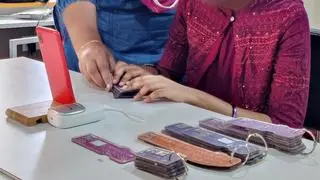Vandhana Ramanathan believes that challenges women entrepreneurs and self-employed women face are vastly different from what men face. It is not just about taking care of the household, she says. Women, invariably, take a break from their work routine because of marriage and children and once they come back to work, there is a huge gap in their life. They do not have a network that they can rely on, they are not abreast of the latest developments and need help in various issues such as how to take an idea forward, fund raise and business plan.
Vandhana herself had gone through this stage. She was working in an IT company before she quit. Once she started working again, she says she found it difficult to strike a work-life balance, especially since there was a long commute from her home to her office and back. That is when she and Jinal, who were colleagues in an ad agency, discussed and decided to become entrepreneurs. They started Lets SOS, an all-women digital marketing agency. “We spoke to a lot of women who had quit their jobs and who were at home. We got them in as content writers and designers. We used to work on contract basis with them. We had 30-40 women working for us,” says Vandhana. These women were not just based in Chennai, but were in Canada or Delhi or Coimbatore.

Vandhana Ramanathan, CEO and Co-Founder, WSquare

Vandhana Ramanathan, CEO and Co-Founder, WSquare
The biggest challenge
Lets SOS (Shout out Social) did not have an office space and Vandhana says they used Google Drive, Google Hangout and used to chat over Skype with clients or meet clients in coffee shops. Two years into running Lets SOS, Vandhana says they realised that there were a lot of issues women faced while working from home. Women faced a lot of distractions while working from home, which affected their consistency and productivity, according to her.
Vandhana says she had experienced this herself, when she was working from home. She would go to a coffee shop or a co-working space, at least twice a week, “just to be more productive.” That is when Vandhana and Jinal started toying with the idea of a venture that would provide co-working space exclusively for women. Thus was born WSquare, a company that offers co-working space for women in a residential neighbourhood in Chennai. Spread over 2,400 sq ft, WSquare – launched on International Women’s Day (March 8) in 2017 – has 30 work spaces for women and offers them various options – daily, weekly or monthly passes.
They also realised that women entrepreneurs need much more than a shared working space. WSquare offers other services such as crèche, on-call grocery and on-call beautician. It also conducts workshops on various topics including skill building, financial planning, work-life balance, leadership coaching, grooming, public relations, etiquette, social media and digital marketing and technology. It has mentors coming over to address women entrepreneurs and even runs an incubation programme.

Workshops and hackathons
According to Vandhana, WSquare has names of close to 2,200 women entrepreneurs and self-employed women, and from this group many come for either the co-working space or to attend the workshops. “We have also done start-up events. We recently had a hackathon, which was India’s women-led hackathon in fintech and AI, along with Go Daddy and PayPal,” says Vandhana.
Jinal Patel points out that when they started WSquare, there were not many who understood the concept. Many thought that the company offered jobs to women and WSquare got a lot of job applications. “We understood that there is a whole pool out there looking for some sort of help and support. Co-working is a small aspect of WSquare. We have created this app called WConnect that helps women register,” says Jinal. The biggest challenge they faced was in getting the idea across that a co-working space is an ecosystem and not just a place to work out of, according to her. For the first few months, adds Vandhana, there were not too many coming for working space. There were a lot of questions, but once they understood what was on offer, there has been a steady growth in the number of women using the co-working space or attending workshops. On an average, 24 women use the co-working space regularly. Apart from charging for the co-working space, WSquare, according to Jinal, gets a bulk of its revenues from the workshops it conducts.
Vandhana and Jinal say the venture has broken even, but they are looking to raise funds, for which they are in talks with potential investors. The money will be used to have incubation programmes across different cities.
“Our target is not to have 5-10 co-working spaces across the country. We felt that the need for support for women is more than that for facilities. We want at least 15-20 per cent of women entrepreneurs to scale up businesses and launch their products in 2-3 cities,” says Vandhana.








Comments
Comments have to be in English, and in full sentences. They cannot be abusive or personal. Please abide by our community guidelines for posting your comments.
We have migrated to a new commenting platform. If you are already a registered user of TheHindu Businessline and logged in, you may continue to engage with our articles. If you do not have an account please register and login to post comments. Users can access their older comments by logging into their accounts on Vuukle.